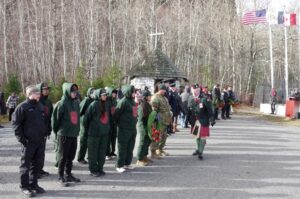Fort William First Nation commemorates Remembrance Day up on Anemki Wajiw

By Rick Garrick
FORT WILLIAM FIRST NATION — A cold blustery morning did not stop Fort William First Nation from holding its Remembrance Day service on Nov. 11 at the cenotaph on Anemki Wajiw. The Remembrance Day service was started in about 1995 by the late World War II veteran Frank Banning, and his family has carried it on since he passed in 2010.
“[They started] coming up here on the mountain to acknowledge our people from Fort William First Nation and others who have served in war and continue to serve,” says Fort William Chief Michele Solomon. “That cenotaph was put there by [Banning] and his family and it is a tradition that has continued.”
Chief Solomon says the service had a bit of everything, including the laying of wreathes by a variety of people and the presence of military and police representatives, Junior Canadian Rangers, students from Algonquin Avenue Public School in Thunder Bay, women hand drummers, and a big Grandfather Drum.
“With the big drum and the hand drums, it’s really a beautiful mixture of people coming together to acknowledge this day,” Chief Solomon says, noting that they also had a luncheon at the Fort William First Nation Community Centre after the service. “It is a nice way to finalize the day and spend time together.”
Corine Bannon, Native language teacher at Algonquin Avenue Public School and Fort William citizen, says the Grade 5-6 class performed O’ Canada in Anishinaabemowin and two students also performed a prayer in Anishinaabemowin during the service.
“All of them are really good at singing O’ Canada in Anishinaabemowin so I wanted them to come up and just be a part of a Remembrance Day ceremony and share the language, Anishinaabemowin,” Bannon says. “We’ve been here before COVID with a different group but these [students] are amazing.”
Fort William Elder Gene Bannon says it was important to recognize the First Nations veterans who made their contributions to the country’s war efforts.
“It’s very important because they’re the people that made our country great, safe, and also it’s good that we have veterans to represent our [Indigenous] people because we gave our contribution to the wars,” Elder Gene says. “We always have the Eagle Staff up here, we’ve had it for 20 years now — it’s our way of honouring our culture and our mountain here.”
Fort William Elder Sheila DeCorte says she enjoyed attending the service to honour the First Nations veterans because they didn’t always get the same treatment when they returned home from the wars.
“It took a long time for them to start getting the recognition that they deserved for the contributions that they made in the war,” Elder DeCorte says. “As First Nations myself, I just feel it’s important for me to come and celebrate the commemoration up on Anemki Wajiw because it’s so very powerful up here. It was a very cold day today with the strong winds; usually we see eagles flying up there but I didn’t notice any today, probably because of the wind.”
Long Lake #58 Councillor Narcise Kakegabon says it was important to attend the service even though it was cold and windy on Anemki Wajiw.
“It’s a little windy, it’s a little cold, but if you think back about the wars that we had, our veterans didn’t have the variety for the elements,” Kakegabon says, noting that they fought through cold winters and rain and mud. “If we can’t honour our veterans for an hour or two hours, then we should seriously take a look at what is important in our lives and what we have today.”

